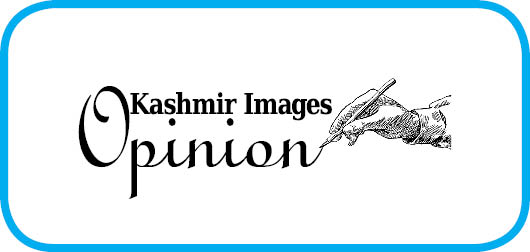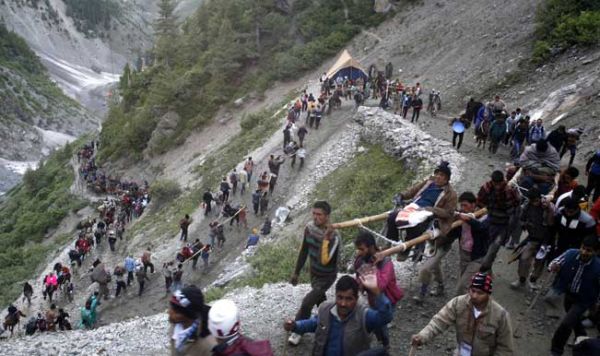By: Shafqat Shafi
Former chief minister and National Conference vice-president Omar Abdullah on Friday (July 26) warned people against boycotting the forthcoming Jammu and Kashmir Assembly elections, saying that the boycott will help the Bharatiya Janata Party (BJP). “If the trend of Parliamentary polls continues in the Assembly elections, then there will be a BJP MLA from Tral. Imagine, there will be a BJP MLA from the same Tral where from [Hizbul Mujahideen commander] Burhan Wani and Zakir Musa were if there is a boycott.”
BJP and some TV anchors were quick to latch on to Omar Abdullah for invoking the names of Burhan Wani and Zakir Musa — accusing him of praising these militants. Omar defended himself by saying that he did not intend to praise the dead militants. “I did no such thing,” he said on Twitter. “I was talking about how people should not boycott elections. I mentioned that Tral, which gave birth to Burhan & Musa, also gave the BJP a lead in the LS elections because of a boycott. I was pointing out the strange contradiction of this. How is this praise?”
Now there are a few contradictions, or at least deliberate omissions in Omar Abdullah’s assertions, which his detractors perhaps missed out by default.
It’s true that the BJP secured a visible lead in Tral. But if it could be attributed to just the low voter turnout, then this trend should have showed elsewhere as well, in all other Assembly segments. After all, low voting was fairly widespread and not exclusive to Tral only. Common sense, therefore, is that the saffron party doing good in Tral is not just a machination of poll boycott, but there is something more to it, which the grand old party of Kashmir politics needs to mull over.
Coming to the election boycott, it goes without saying that it was the badly rigged 1987 Assembly elections — for which people of Kashmir are yet to forgive NC — which pushed the people of the Valley to the brink by divesting them of any faith they had in the election process. Kashmir had always lacked a healthy template of fair elections, but 1987 is a watershed moment. It supplied reasons for boycotts of subsequent elections, though to varied degrees, with both the separatists and their armed colleagues vociferously campaigning for it. In recent Lok Sabha polls too, the situation was no different.
However even if one is to discount the coercion from different quarters forcing the people to stay away from vote, there is still a very vital aspect which, for some reasons, has thus far not been looked into. That is — people have not been given an attractive reason to vote.
Countless studies conducted by very influential institutions like the World Bank into the causes of conflict suggest that if a place faces an unusually high risk of conflict from a particular source, it should devote particular attention to reducing that risk. In case of Kashmir, unfortunately despite all the bloodshed and mayhem of past 30 years, not much has been done to take care of and neutralize the risks posed by the pre-militancy era factors like discredited governance structures, which had triggered the conflict in the first place.
Instead the situation has only graduated from bad to worse. Corruption and political unaccountability have grown and multiplied; government’s institutions and systems, including the all-important correction systems, remain as ineffective as they were prior to 1989. Now if the people are time and again asked to come out and vote by choosing among the same tested, tried, failed and discredited political lot, why should they do so? Expecting people to vote for the same very people whose self-seeking politics had pushed the young protagonists of Kashmir into the deeper recesses of conflict trap is asking for too much!
Howsoever anyone may want to disagree, fact of the matter remains that those who remain in the fray of electoral politics including Abdullahs and Muftis and a whole lot comprising the concentric layers of political flatterers and sycophants of the two families have not been able to enthuse and encourage the general public to vote for them. There is a reason for it. People voted NC to power with absolute majority in 1996 elections. But what happened to the promises and the pledges NC had made? What happened to the promise of ‘Naya Kashmir’?
In the year 2002, people again braved threats of life and limb and voted – this time bringing PDP-Congress combine to power. Self-rule or other pre-poll promises didn’t materialize, but yes Amarnath land row agitation cost nearly 100 civilian lives besides deeply polarizing the state along religious lines. In the elections that followed, people again came out to vote amid boycott calls. Now NC-Congress coalition came up with the same old faces. Omar Abdullah was the exception in terms of being new hope, but this dispensation couldn’t sustain that hope for long. The summer agitation of 2010 shadowed the 2008 land row agitation in terms of pornographic vulgarity of violence. In 2014, PDP was again given a second chance and its track record in this tenure including 2016 agitation and its civilian costs are too fresh in popular memory to merit a recall.
Simple point that is being made is that if the people of Kashmir boycott elections, it is primarily because in doing so they are trying to make a political statement. “We are not amused and enthused by those who are in the fray; we have given them repeated chances and they have failed us repeatedly! We no longer trust them!”
For some reasons nobody seems to be listening to what poll boycotts are actually saying. Instead, everybody is interpreting it selectively as per their whims and fancies to suit their political ends.
Once the state and its systems heed and understand the popular misgivings Kashmir’s proletariat has against the political haves, who have thrived and prospered by monopolizing the power and wealth, a whole new understanding of poll boycotts will be revealed. Then, this may well mean that if people have a reason to vote, they will certainly come out and vote — any amount of coercion notwithstanding. And what could be a bigger and better reason than the people of promise coming forward to try and replace the rotting and stinking deadwood of Kashmir politics!




